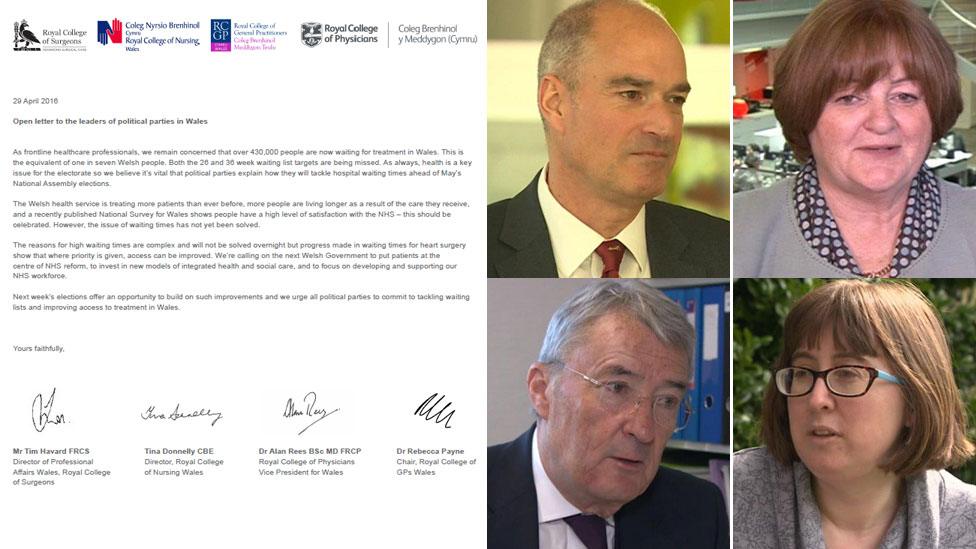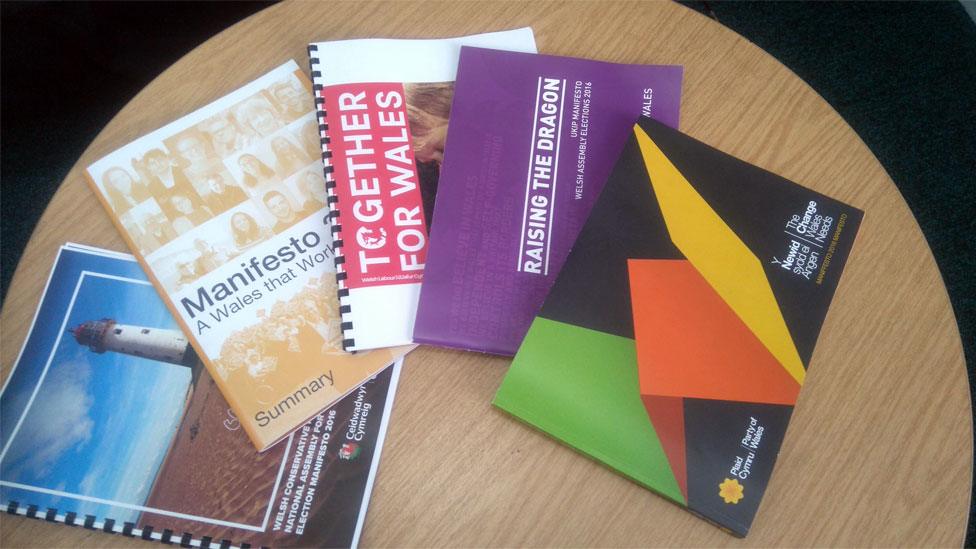Health professionals call for NHS Wales 'vision'
- Published

None of the main political parties in Wales are offering a long term vision for the NHS, according to professional bodies representing frontline staff.
Hospital doctors, surgeons, GPs and nurses told BBC Wales they are also concerned about a lack of detail in party manifestos.
All contained useful ideas among pledges but there was need to tackle ever increasing demands, they said.
Meanwhile, an open letter to parties calls for waiting times to be tackled.
BBC Wales spoke to six professional organisations representing tens of thousands of NHS staff.
Four of them also offered to examine each main party manifesto in detail for us.
The full responses can be found here:
Specifically, there are concerns none of the parties have set out a vision of how the NHS needs to change in the next five or 10 years to deal with growing pressures from an aging population, with more complex needs.
Nor, they have argued, is there a clear indication about much money would be needed to deliver the changes.
Royal College of Surgeons Wales director Tim Havard said there were concerns over waiting times
Meanwhile, the Royal College of Surgeons (RCS) - which represents most surgeons working in Wales, wants all parties to focus on reducing waiting lists.
In an open letter to all the political party leaders published on Friday, the College said it is concerned that 430,000 people are waiting for treatment in Wales and that both the 26 and 36 week waiting list targets are being missed.
The letter was also signed by the leaders of the Royal College of Nursing, Royal College of Physicians and Royal College of GPs in Wales.
Tim Havard, director of professional affairs for the RCS in Wales, said it is "broadly encouraged" that many of the parties are pledging to tackle long waits.
Yet he said it will be a tough challenge to address.
"I'd be wary of any political party that say they have simple solutions to this," said Mr Havard, a hospital consultant.
"I think it's going to involve hard and difficult decisions. What we want to see would be the new administration engaging with doctors and nurses to come up with a sensible plan."
He said "quick fixes" had brought improvements in cardiac waiting times for example but had also been followed with investment in cardiac units for the medium and long term.
"We need that sort of initiative and push taken more generally through scheduled care," he added.


The letter has been signed by four medical organisations - pictured Tim Havard, Tina Donnelly, Dr Rebecca Payne and Dr Alan Rees
Dr Alan Rees, vice president of the Royal College of Physicians in Wales which represent hospital doctors, said: "There's an element of mum and apple pie about this.
"All the parties want an efficient comprehensive, health care system in Wales. How you deliver that is dependent on resources and the budget and you need to provide details about how you deliver these plans."
He is opposed to large-scale structural changes but said the NHS had to think beyond the traditional model of GPs and hospitals.
"GPs should be working at the front door of hospitals and hospital consultants should be going out into the community - so we've got to be innovative, be more efficient," he added.

The Royal College of Nursing in Wales (RCN) - which represents 25,000 nurses - is also opposed to any large scale NHS reorganisation but welcomed proposals to train and recruit more nurses.
However, it said more details are needed about how to achieve that.
"We need a vision about what the NHS is going to look like in five to 10 years," said director Tina Donnelly.
"We haven't got that yet. Nobody can tell us.
"It's one thing to say lets have an increase in medical staff. But we know there are recruitment problems across the UK. And we know when we sometimes recruit staff into Wales sometimes they don't want to stay."

The Royal College of Paediatrics and Child Health - which represents around 600 children's doctors in Wales - argued some of the more deep-rooted problems will take longer to address.
Dr Mair Parry, officer for Wales, said: "It's not just something you can put out an advert and get hundreds of nurses applying.
"There are no quick fixes to this. But the problem with long term fixes is it's going to take more than one term of government."

The Royal College of General Practitioners also argues "piecemeal" changes will not be sufficient to address the "crisis" they claim facing family doctors.
It wants 400 extra GPs to be recruited and a big increase in the proportion of the health budget spent on primary care.
"I'm desperately concerned," said Dr Rebecca Payne, Wales chair.
"We need vision, we need to see transformation, we need things delivered differently, we need to make the most of apps and telemedicine and all the ways we can work in the modern world and still keep the best of general practice - that personal relationship with a GP you know and trust."

The British Medical Association - which represents 8,000 doctors in Wales - welcomed commitments for more staff and to improve quality and safety in the NHS.
Yet it suggested the manifestos lack big, radical ideas.
'Not fit for purpose'
Dr Phil Banfield, BMA chairman in Wales, said the Welsh NHS was at a "complete crunch point".
He added: "Either there needs to be an injection of cash or there has to be a radical rethink about how we're going to provide services into the future.
"What's missing is that vision. Starting with the patient - working what their health needs are and challenging health boards and politicians to provide that.
"The NHS is a massively complicated and cumbersome organisation - in some ways it's not fit for purpose. And we're trying to fit the patient to that organisation. That seems to be completely the wrong way round."
All the medical bodies agreed that whoever forms the new Welsh Government needs to listen to the views of patients and frontline staff in developing new health policies.
They also appealed for the political parties to work together to address some of the big challenges that inevitably lie ahead.
- Published28 April 2016

- Published28 April 2016

- Published28 April 2016

- Published28 April 2016

- Published28 April 2016

- Published27 April 2016

- Published4 April 2016

- Published22 April 2016
